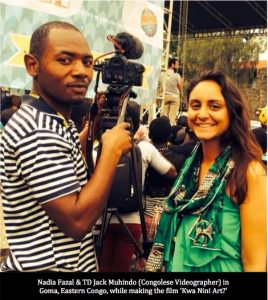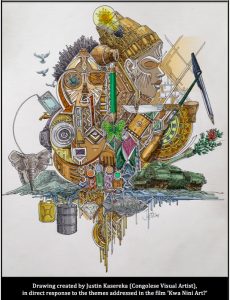Student Blog – A Call to Health Promoters across the Globe: We need to be Avid Listeners
July 14/2017
DLSPH Student Blog

By: Nadia Fazal, Social and Behavioural Health Sciences PhD Candidate; Collaborative Specialization in Global Health
If we believe in health promotion then, I would argue, we also need to believe in supporting the voices of local communities to be heard and recognized. If we believe in equity as a core value of health promotion, then this means supporting the voices of those who are typically unheard as a priority.
As a health promoter, it is precisely these beliefs that led me to pursue my doctoral research about the role of the arts in promoting health in Goma, Eastern Congo.
The Ottawa Charter (1986) defines health promotion as the “process of enabling people to increase control over, and to improve, their health.” It highlights the importance of strengthening community action to promote positive health and well-being. It emphasizes the importance of developing community capacity, which at its very core, recognizes the need for local individuals and communities to put forward their own talents, share their own stories, define their own problems, and identify their own solutions.
If we have a genuine desire to support the strengthening of community action and community capacity, then our first role as health promoters should be to listen. We need to acknowledge our relationship to those whom we are listening to (including aspects of power dynamics, race, culture, gender, educational training, socio-economic status), ask questions, and then listen some more. We need to be humble and recognize our place in working alongside communities to achieve their goals as opposed to leading a project that is divorced from community objectives and desires. To me, this is what it means to be a health promoter.
As a health promoter, global health practitioner, and artist, I have turned to the arts in my pursuit to listen and support the communities I work with. The arts — including dance, music, painting, theatre, and film — can be a powerful vehicle for individuals and communities to express their own stories and perspectives. I have certainly found this to be the case in Goma, Eastern Congo, where I have been working for much of the past six years.
While pursuing my doctoral research in Goma, I have chosen to work alongside local artists. These artists are expressing themselves creatively and nonviolently to share their perspectives; they are using their freedom of expression to highlight the agency of Congolese citizens to create positive change; and, they are speaking out against the social and political injustices happening in their country (that are not only to do with corrupt “African” politicians and warlords, but also to do with a complex colonial past and current international priorities and vested interests). I have been doing my best to listen.
 As part of my PhD research, I created a film about the role of the arts in Goma, and the agency, power, and responsibility of these artists to create positive social change in Eastern Congo. The title of the film is Kwa Nini Art?, which means Art – For What? I chose film as a medium because it can cut across social, cultural, geographical, economic, age, gender, and language barriers to encourage a diverse and wide audience to listen and pay attention.
As part of my PhD research, I created a film about the role of the arts in Goma, and the agency, power, and responsibility of these artists to create positive social change in Eastern Congo. The title of the film is Kwa Nini Art?, which means Art – For What? I chose film as a medium because it can cut across social, cultural, geographical, economic, age, gender, and language barriers to encourage a diverse and wide audience to listen and pay attention.
As someone who is not from Goma or Eastern Congo, I acknowledge that my understanding of the role of the arts in this context is — and always will be — framed from an outsider’s perspective. As a critical qualitative researcher in the social sciences, I acknowledge that my voice is implicit in the film’s narrative (i.e. I decided the focus, who was included/excluded, which content was edited in/out; whose voice was prioritized and framed in a positive/negative light); and, as is the case with any research study, what is presented in this film are my interpretations of the stories of these artists. I also understand that this was all part of my role as a global health promoter, analyst, and filmmaker: I asked questions, listened, asked more questions (including those about my own positionality), and listened again. I analysed, I interpreted, and now — through my film — I want to share the meaning I have made.
I challenge all of us working in the field of public health and health promotion to more fully prioritize the voices and perspectives of the local communities we work with, particularly those who tend to be neglected, unheard, and undervalued. First and foremost, it is our responsibility to be avid listeners.
For more information and/or to support the film that I created as part of my PhD research: